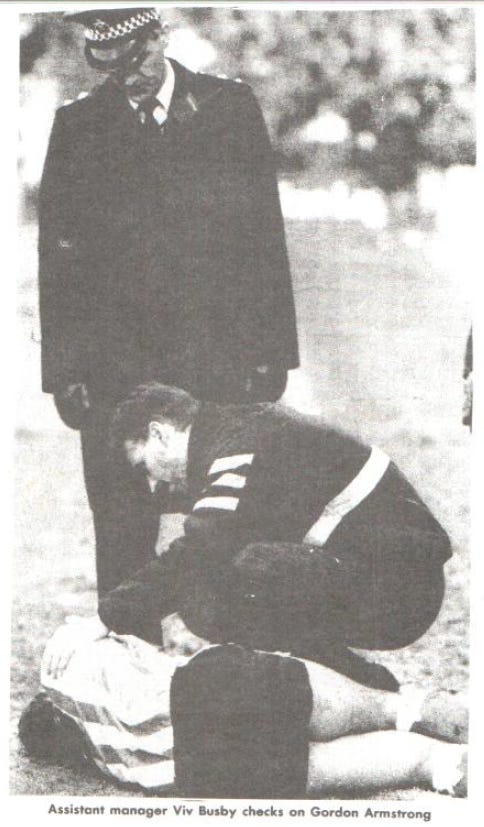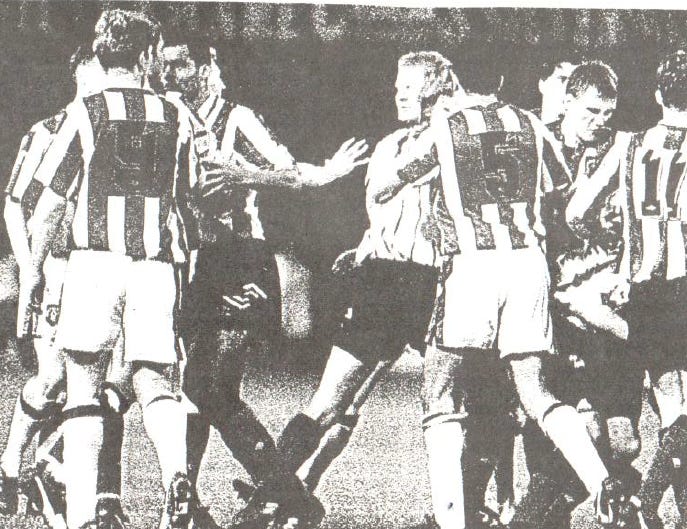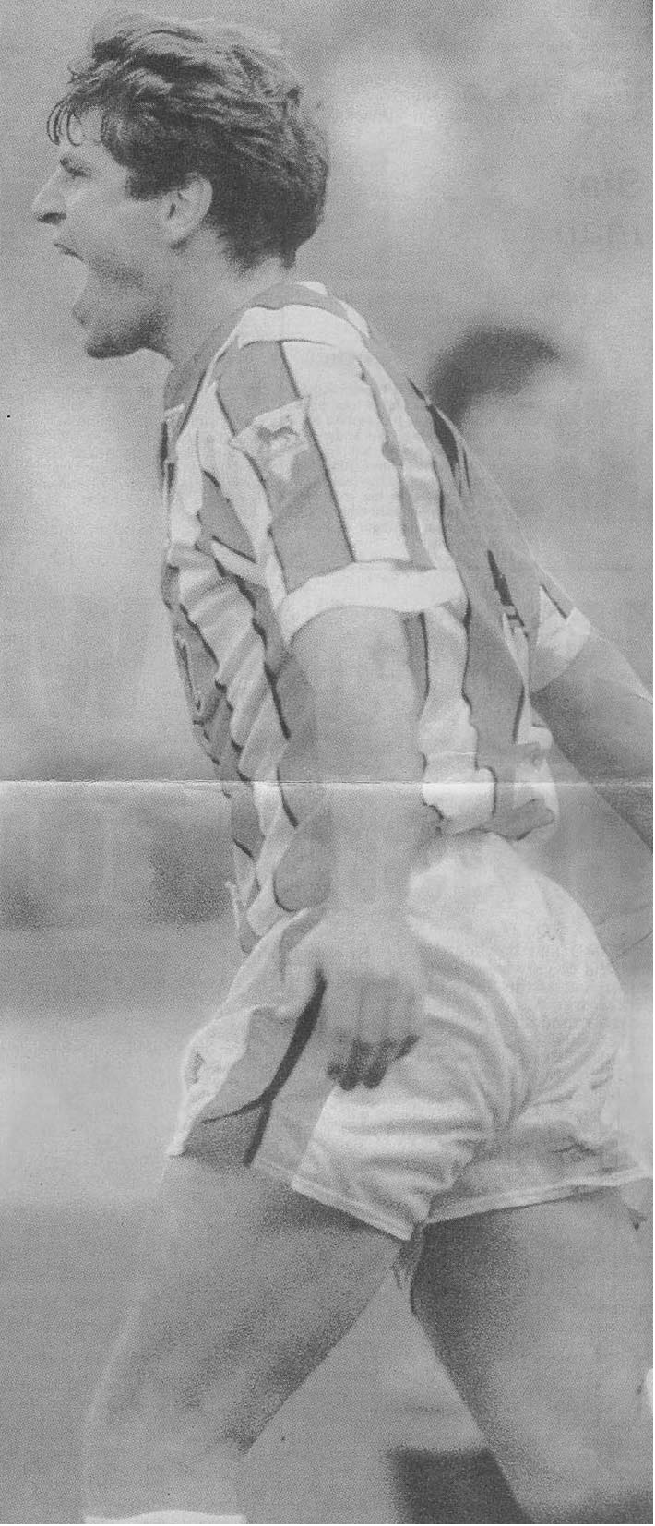Glyn Hodges: “This Man’s Left Foot is Magic!”
Wondrous goals, stunning skills, and a red card from a copper.
In April 1995 I wrote an article for a FourFourTwo magazine feature called “The Boy’s A Bit Special”. My subject was Glyn Hodges, who Blades fans of the time will remember as an immensely talented footballer capable of incredible skill and of scoring wondrous goals, but whose temperament and impulsiveness sometimes let him and his teammates down.
Hodges first came to the Lane on loan from Crystal Palace in January 1991 when United were attempting to claw their way back in touch with the rest of the First Division after gaining just four points from the first sixteen games. Hodges helped spark a run of seven consecutive wins that took United clear of the relegation zone. Quoted £410,000 to buy him, United didn’t have the money, so the club organised a ‘Grand National’ raffle (based around the famous horse race) to raise the funds. It was so well subscribed that Hodges’s signing soon became permanent, and the raffle became known as “The Glyn Hodges Draw”. And what a great signing he proved to be.
United didn’t have the money, so the club organised a ‘Grand National’ raffle
On his first return to Selhurst Park with United Hodges scored the type of dipping, long-range goal that only Eric Cantona and Matt Le Tissier (in that era) were supposed to be capable of. Palace manager Steve Coppell was impressed, saying: “It was a great piece of skill, a great piece of awareness.” Coppell was not the only opposing manager to express such admiration. When Hodges scored a carefully controlled 18-yard volley against Wednesday, Trevor Francis was moved to say: “We might have got away with it had the ball fallen to any other United player. And it went to his left foot.” And who can forget Hodges’ audacious (and courageous) penalty smashed into the top left-hand corner in the FA Cup quarter-final penalty shoot-out win over Blackburn Rovers?
Highlights, including Hodges’ Penalty:
“This man’s left foot is magic!”
Or when John Motson excitedly screeched after Hodges’ exquisite lob over Peter Schmeichel in United’s 2-1 FA Cup win over Manchester United in February 1993: “This man’s left foot is magic!” Before this tie Dave Bassett called Hodges “Our Cantona” and, just like Manchester United’s enigmatic Frenchman, dark clouds occasionally clouded creativity. We will look at two such occasions here.
On March 9th 1991 United travelled to Roker Park to play Sunderland. It was a crunch game. Both teams had been near the foot of the table all season, although United, with five wins in a row, had started to inch clear. The winners would be well set to escape the relegation trapdoor, whereas the losers would be in deep trouble. The tension was thick from the start, and the match teetered on a knife-edge of violence. John Gannon and Kevin Ball, feelings already taut after Ball, then a Portsmouth player, assaulted Gannon a year earlier, clashed and both were sent off, but nobody could have predicted what would happen at the end of the match.
Hodges, substituted near the end following a running feud with Sunderland’s Gordon Armstrong, waited to ‘greet’ the Sunderland player at the final whistle after United’s tight 1-0 win thanks to an Ian Bryson goal. There was a melee, and Armstrong went down. Hodges was accused of head-butting him, later to be found guilty and banned for six matches. But United stayed up, Sunderland went down.
Just over two years later United went to Hillsborough in a match they could not afford to lose if they were to keep the bottom three at arm’s length and close the gap on Crystal Palace one place above. It was just a few weeks after the two teams met in the FA Cup semi-final at Wembley.
Brian Deane headed the Blades in front from Hodges’ cross just before half time but with twelve minutes remaining Paul Warhurst equalised. Three minutes later all hell broke loose. A United attack was cleared and the ball was somewhere near the half way line when it was noticed that John Harkes was lying prostrate in Wednesday’s penalty area. Hodges was suspiciously nearby with Carlton Palmer, Mark Bright, John Sheridan and Warhurst confronting him. Suddenly everybody started racing to either join in or split it up, with Charlie Hartfield inevitably heavily involved, but what the cameras caught but all three officials missed was David Hirst sprinting forty yards and landing a two-handed punch on the back of Mitch Ward’s neck. Charlie then attempted to exact retribution on Hirst.
It appeared that all three officials had also missed what had gone on between Hodges and Harkes because after referee Ken Redfern had calmed everything down he went over to speak to the linesman nearest the incident. It seemed clear from their discussions that he had not seen it either. Redfern then went to speak to a policeman for a few seconds before returning to the pitch to show Hodges the red card. It was a strange situation. Hodges had clearly done something to Harkes (the consensus was an elbow or a punch) but it a seemed equally clear that none of the officials had seen it, so how could they send him off? On a policeman’s say so, that’s how, surely a footballing first. Hodges accepted the decision without protest, but Carl Bradshaw was furious, giving the referee and linesman a vicious verbal assault. United hung on for the last ten minutes to earn a vital point that went a long way to keeping the Blades in the Premier League for another season.
Redfern then went to speak to a policeman for a few seconds before returning to the pitch to show Hodges the red card.
The following night’s Star reported events, in which Redfern did not explain his conversation with the policeman, insisting his linesman saw everything:
Sheffield United manager Dave Bassett will confront Glyn Hodges over his sending-off at Hillsborough and is set to discipline him after the incident that led to the brawl in last night’s derby clash. Hodges was dismissed by referee Ken Redfern eight minutes from time for an off-the-ball incident that left Wednesday’s John Harkes on the floor and requiring treatment. Redfern admitted he did not see the incident but acted on the word of linesman David Oliver from Darlington. “My linesman said there was an incident off the ball and that Hodges had elbowed an opponent,” said Redfern. The blow followed a tackle by Harkes on Hodges in the Wednesday penalty area. Harkes commented: “When I made the tackle his arm came across and hit me on the nose. Blood was dribbling from it. As I was walking away, he came alongside and gave me an elbow.” Hodges refused to comment. In between the incident and the sending off there was a confrontation between several players and at one stage virtually all the players on both sides became involved, although some were trying to prevent things getting worse.
Said Bassett: “I know managers get accused of not seeing things but I didn’t see the sending-off incident. I saw the ref afterwards and he said he didn’t see it but the linesman did and he said Hodges elbowed the boy, which is a stupid thing to do if he’s done it. I’ve got to take [the referee’s] word for it and I wanted to know in my own mind what it was for without waiting for the report. Hodges is upset and I said I’d talk to him on Friday and take it a stage further and deal with him as a disciplinary matter then.”
Bassett and Owls assistant manager Richie Barker went on the field during the player confrontation and Bassett said that was to calm things down. “I wasn’t going to start fighting was I?” said Bassett. “There were one or two little incidents but most of the players, like Woods and Gayle, were calming it down. One or two were having a little push but a lot of it was handbags. But we didn’t need to go down to ten men at that stage when they had just equalised.”
Wednesday boss Trevor Francis commented: “There was an unsavoury moment that you don’t want to see in any match, anywhere. And after all the things said in the past few weeks about the friendly rivalry between the supporters and the way they behaved themselves at Wembley, it was very disappointing to see the players not keeping their cool. On the sending off itself, Francis said he didn’t see it. “I was told Hodges elbowed John Harkes in the face.”
When Deane departed to Leeds that summer, whoever was to take over his trademark No.10 shirt had a big hole to fill and really the only man to do it was Hodges. It was just a symbolic thing but it showed Hodges’ importance and confidence. It didn’t concern him that he was literally taking over Deano’s shirt – in fact he relished it.
United were relegated the following season and Hodges’ goal that fateful day at Stamford Bridge proved to be in vain. Early in the 1994/95 season Hodges was again involved in controversy, being one of the four players (plus Dave Bassett) sent off in the farcical Anglo-Italian Cup tie against Udinese at the Lane. United were in serious danger of relegation midway though the 1995/96 season when Mike McDonald brought in Howard Kendall to replace Bassett. Kendall performed immediate surgery on the squad, getting rid of Nathan Blake, Paul Rogers and Paul Holland amongst others, but Hodges was retained, at least for a short while, as Kendall recognised his special qualities. He played an important part in the two successful FA Cup games against Arsenal, he scored to earn a late point at Tranmere but had to come off the bench to do so, then another substitute appearance in the televised FA Cup match with Aston Villa was to be his last.
He left us, though, with one final glimpse of his class. It was a treacherous freezing pitch, having only been cleared of heavy snow the day before, but the doubtful footing didn’t prevent Hodges from making Serbia international Savo Milošević look a fool. A headed clearance dropped to Hodges on the edge of his own area, slightly behind him, so he raised his left foot and nonchalantly brought the ball down with his heel. As Gary Charles approached to challenge him Hodges put his foot on the ball and the Villa full back sailed past. Next came Savo. There was a drag-back, a turn inside and then another back again as Savo was sent this way and that like a dog chasing its tail, before the quickstep was rounded off with a neat pass outside to Mitch Ward with Savo looking totally nonplussed.
The crowd in the background rose as one, arms raised above their heads in applause. We were losing and three minutes way from going out of the cup, but this was wonderful stuff. It didn’t affect the outcome of the match but it was one of those moments that makes a defeat worthwhile. “A little bit of ‘Ole’ there from Hodges!” grinned commentator Clive Tyldesley, before pointedly adding, “but they need it at the other end of the pitch.” This was Glyn Hodges all over. More skill than many players earning ten times his money but not always applied in the right place.
And it was virtually the last thing Glyn Hodges did in a Sheffield United shirt, as Howard Kendall let him go to Derby County a few days later. This valedictory moment summed up Hodges’ United career perfectly – a stunning display of skill, but ultimately ending in disappointment. It’s a pity he couldn’t have stayed at the top a bit longer, but for his spectacular goals, his strutting arrogance, his breathtaking dexterity on the ball and his unruly flashes of temper, Glyn Hodges really was a Blades hero.







I once played in a charity Blades v Owls 5-a-side game organized by the now closed Robin Hood pub at Stannington. Both sides were to feature an ex-player. I forget the Owl (if there was one) but somehow the Blades had wangled Glyn Hodges. I have never seen anyone hit a ball quite like he did. I played in goal and had a lot of sympathy for my Wednesday counterpart, as the pace and power that Hodges displayed in his approximately 9 goal haul was unbelievable; from drawing his foot back to the ball being in the back of the net was just a blur.
This was after he retired, and was coaching at Blackburn I think. I always recall him in his playing days being one of those players who looks a bit out of shape (compared to those around him), a little thick in the middle perhaps. Shows the difference between sportsmen and normal humans - in changing rooms I saw he still had a six pack to die for and looked as fit as a fiddle!
Thanks, Matthew
It’s always fascinating to read about players “before my time” in supporting Sheffield United and Glynn sounds a really *cough* interesting character.
The videos are great, too – that turn on the ball like something Iliman Ndiaye or Chris Basham might have done if Hodges hadn’t trademarked it first!
Sounds like a very good servant to Sheffield United and you know that talent is valued when it’s admired by other managers and commentators.
Sue.